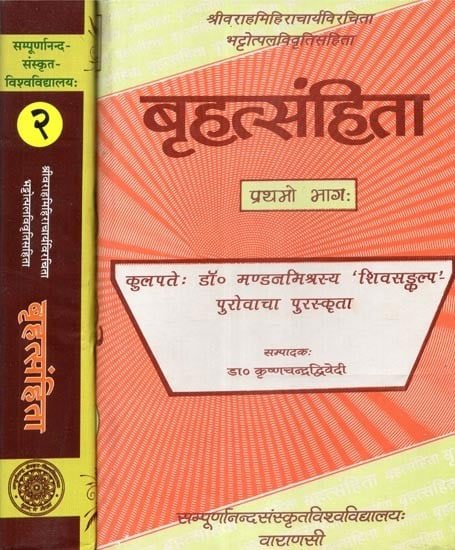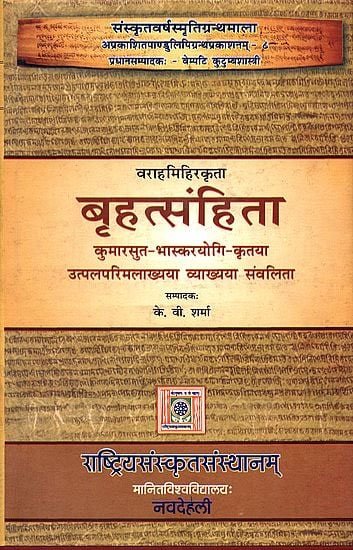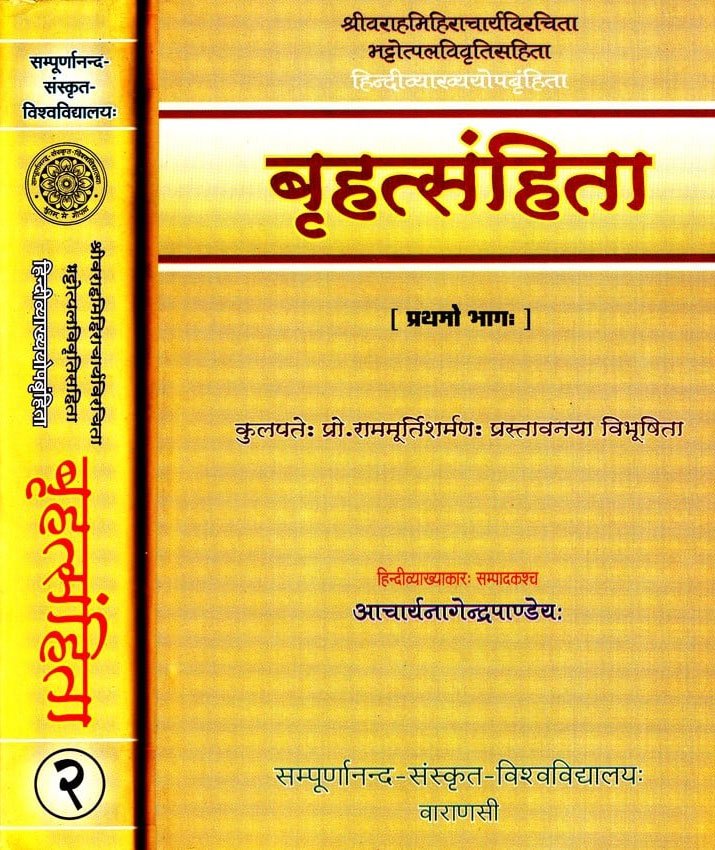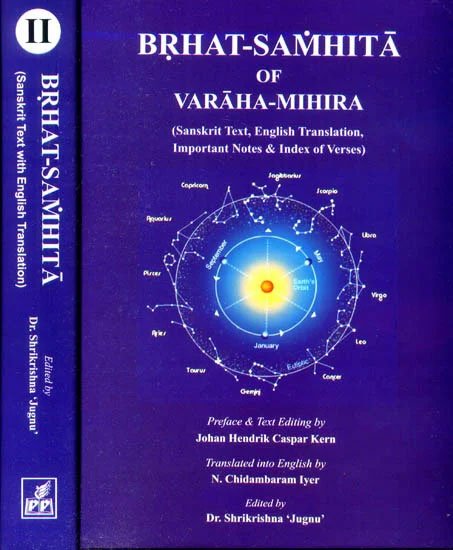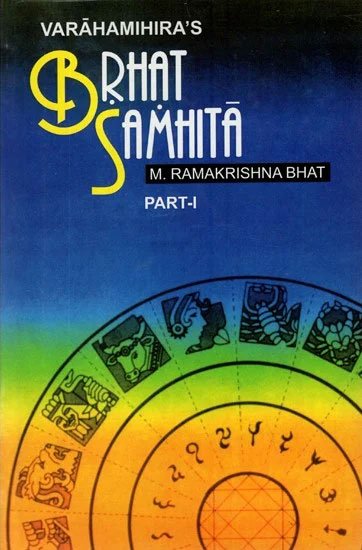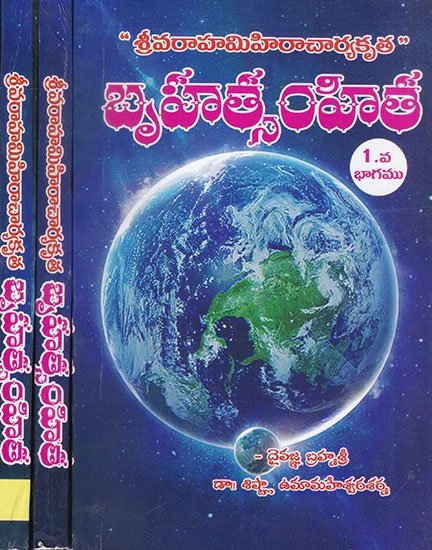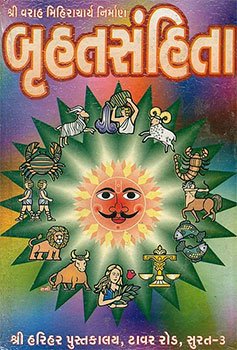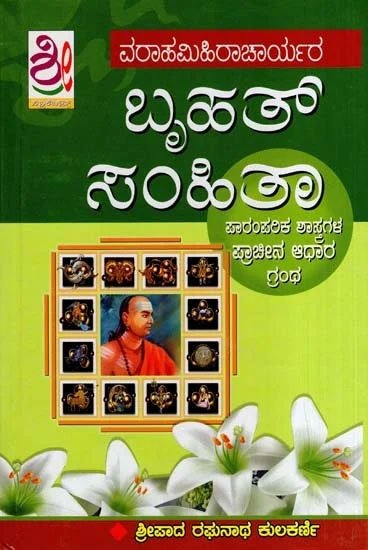Brihat-samhita [sanskrit]
26,560 words
The Sanskrit text of the Brihat-samhita from the 6th-century authored by Varaha Mihira in present-day Ujjain, India. It primarily deals with astrology and astronomy but is presented as an encyclopedia of knowledge.
Verse 50.1
दैवज्ञेन शुभाशुभं दिगुदितस्थानाहृतानीक्षता वाच्यं प्रष्टृनिजापराङ्गघटनां चालोक्य कालं धिया ।
सर्वज्ञो हि चराचरात्मकतयासौ सर्वदर्शो विभुश्चेष्टाव्याहृतिभिः शुभाशुभफलं सन्दर्शयत्यर्थिनाम् ॥ १ ॥
daivajñena śubhāśubhaṃ diguditasthānāhṛtānīkṣatā vācyaṃ praṣṭṛnijāparāṅgaghaṭanāṃ cālokya kālaṃ dhiyā |
sarvajño hi carācarātmakatayāsau sarvadarśo vibhuśceṣṭāvyāhṛtibhiḥ śubhāśubhaphalaṃ sandarśayatyarthinām || 1 ||
The Sanskrit text of Verse 50.1 is contained in the book Brihata Samhita (Sanskrit Text with Hindi Translation) by Pandit Achyutananda Jha. This book is available online or you could buy the latest edition:
Read online Buy now! The Sanskrit text by Pandit Achyutananda Jha (2001)
Glossary of Sanskrit terms
Note: This extracts Sanskrit terms and links to English definitions from the glossary, based on an experimental segmentation of verse (50.1). Some terms could be superfluous while some might not be mentioned. Click on the word to show English definitions.
Daivajna, Shubhashubha, Dish, Udita, Tha, Ahrita, Iksha, Tas, Vacya, Nija, Paranga, Ghatana, Kya, Kalam, Kala, Dhi, Sarvajna, Caracara, Maka, Taya, Asi, Asu, Adah, Sarvada, Risha, Vibhu, Ceshta, Vyahriti, Shubhashubhaphala, Sandarsha, Yat, Yati, Yatin, Yatya, Arthin,
Analysis of Sanskrit grammar
Note: this is an experimental feature and only shows the first possible analysis of the Sanskrit text (Verse 50.1). If the system was successful in segmenting the sentence, you will see of which words it is made up of, generally consisting of Nouns, Pronouns, Verbs, Participles and Indeclinables. Click on the link to show all possible derivations of the word.
- Line 1: “daivajñena śubhāśubhaṃ diguditasthānāhṛtānīkṣatā vācyaṃ praṣṭṛnijāparāṅgaghaṭanāṃ cālokya kālaṃ dhiyā ”
- daivajñena -
-
daivajña (noun, masculine)[instrumental single]daivajña (noun, neuter)[instrumental single]
- śubhāśubham -
-
śubhāśubha (noun, masculine)[adverb], [accusative single]śubhāśubha (noun, neuter)[adverb], [nominative single], [accusative single]śubhāśubhā (noun, feminine)[adverb]
- dig -
-
diś (noun, feminine)[compound], [adverb], [nominative single], [vocative single]
- uditas -
-
udita (noun, masculine)[nominative single]√vad -> udita (participle, masculine)[nominative single from √vad class 1 verb]
- thān -
-
tha (noun, masculine)[accusative plural]
- āhṛtānī -
-
āhṛta (noun, neuter)[nominative plural], [vocative plural], [accusative plural]
- īkṣa -
-
īkṣa (noun, masculine)[compound], [vocative single]īkṣa (noun, neuter)[compound], [vocative single]
- tā* -
-
ta (noun, masculine)[nominative plural], [vocative plural]tā (noun, feminine)[nominative plural], [vocative plural], [accusative plural]tas (noun, masculine)[nominative single]sā (noun, feminine)[nominative plural], [accusative plural]
- vācyam -
-
vācya (noun, masculine)[adverb], [accusative single]vācya (noun, neuter)[adverb], [nominative single], [accusative single]vācyā (noun, feminine)[adverb]√vac -> vācya (participle, masculine)[adverb from √vac]√vac -> vācya (participle, neuter)[adverb from √vac]√vac -> vācyā (participle, feminine)[adverb from √vac]√vac -> vācya (participle, masculine)[accusative single from √vac]√vac -> vācya (participle, neuter)[nominative single from √vac], [accusative single from √vac]
- praṣṭṛ -
-
praṣṭṛ (noun, masculine)[compound], [adverb]
- nijā -
-
nijā (noun, feminine)[nominative single]
- parāṅga -
-
parāṅga (noun, neuter)[compound], [vocative single]
- ghaṭanām -
-
ghaṭanā (noun, feminine)[accusative single]
- cālo -
-
- kya -
-
kya (noun, neuter)[compound], [vocative single]
- kālam -
-
kālam (indeclinable)[indeclinable]kāla (noun, masculine)[adverb], [accusative single]kāla (noun, neuter)[adverb], [nominative single], [accusative single]kālā (noun, feminine)[adverb]
- dhiyā -
-
dhī (noun, feminine)[instrumental single]
- Line 2: “sarvajño hi carācarātmakatayāsau sarvadarśo vibhuśceṣṭāvyāhṛtibhiḥ śubhāśubhaphalaṃ sandarśayatyarthinām ”
- sarvajño* -
-
sarvajña (noun, masculine)[nominative single]
- hi -
-
hi (indeclinable particle)[indeclinable particle]
- carācarāt -
-
carācara (noun, masculine)[adverb], [ablative single]carācara (noun, neuter)[adverb], [ablative single]
- maka -
-
maka (noun, masculine)[compound], [vocative single]maka (noun, neuter)[compound], [vocative single]
- tayā -
-
taya (noun, masculine)[compound], [vocative single]tā (noun, feminine)[instrumental single]sā (noun, feminine)[instrumental single]√tay (verb class 1)[imperative active second single]
- asau -
-
asi (noun, feminine)[locative single]asi (noun, masculine)[locative single]asu (noun, masculine)[locative single]adaḥ (pronoun, masculine)[nominative single]adaḥ (pronoun, feminine)[nominative single]
- sarvadar -
-
sarvadā (indeclinable)[indeclinable]sarvada (noun, masculine)[compound], [vocative single]sarvada (noun, neuter)[compound], [vocative single]sarvadā (noun, feminine)[nominative single]
- ṛśo* -
-
ṛśa (noun, masculine)[nominative single]
- vibhuś -
-
vibhu (noun, masculine)[nominative single]vibhu (noun, feminine)[nominative single]
- ceṣṭā -
-
ceṣṭā (noun, feminine)[nominative single]
- vyāhṛtibhiḥ -
-
vyāhṛti (noun, feminine)[instrumental plural]
- śubhāśubhaphalam -
-
śubhāśubhaphala (noun, masculine)[adverb], [accusative single]śubhāśubhaphala (noun, neuter)[adverb], [nominative single], [accusative single]śubhāśubhaphalā (noun, feminine)[adverb]
- sandarśa -
-
sandarśa (noun, masculine)[compound], [vocative single]
- yatya -
-
yati (noun, masculine)[compound], [adverb], [nominative dual], [vocative dual], [accusative dual]yatin (noun, masculine)[compound], [adverb], [nominative single]yatya (noun, masculine)[compound], [vocative single]yatya (noun, neuter)[compound], [vocative single]yati (noun, feminine)[compound], [adverb], [nominative dual], [vocative dual], [accusative dual]yatī (noun, feminine)[compound], [adverb], [nominative single], [vocative single]√yat -> yatya (absolutive)[absolutive from √yat]yat (noun, masculine)[locative single]yat (noun, neuter)[nominative dual], [vocative dual], [accusative dual], [locative single]√i -> yat (participle, masculine)[locative single from √i class 2 verb]√i -> yat (participle, neuter)[nominative dual from √i class 2 verb], [vocative dual from √i class 2 verb], [accusative dual from √i class 2 verb], [locative single from √i class 2 verb]√i -> yatī (participle, feminine)[nominative single from √i class 2 verb], [vocative single from √i class 2 verb]√yat -> yatya (participle, masculine)[vocative single from √yat class 10 verb]√yat -> yatya (participle, neuter)[vocative single from √yat class 10 verb]
- arthinām -
-
arthin (noun, masculine)[genitive plural]arthin (noun, neuter)[genitive plural]
Other editions:
Also see the following editions of the Sanskrit text or (alternative) English translations of the Verse 50.1
Brhatsamhita with the Commentary of Bhattotpala
by Krishna Chandra Dwivedi (2016)
Publisher: Sampurnanand Sanskrit University; 1229 pages;
Buy now!
Brihat Samhita with the Commentary of Utpalapatimala of Yogisvara
by K. V. Sharma (2012)
Publisher: Rashtriya Sanskrit Sansthan, Janakpuri; 754 pages; ISBN-10; 8186111360; ISBN-13: 9788186111369
Buy now!
Brihat Samhita (Hindi Translation)
by K. V. Sharma (2002)
Publisher: Sampurnanand Sanskrit University; 2359 pages; ISBN-13: 9789387890008.
Buy now!
Brhat Samhita (English translation)
by N. Chidambaram Iyer (2022)
Publisher: Parimal Publication Pvt. Ltd.; 801 pages; Edited by Dr. Shrikrishna Jugnu; ISBN-10: 8171104215; ISBN-13: 9788171104215.
Buy now!
Brhat Samhita (English with notes)
by M. Ramakrishna Bhat (2010)
Publisher: Motilal Banarsidas Publishers Pvt. Ltd.; 1155 pages; ISBN-10: 8120810600; ISBN-13: 9788120810600.
Buy now!
Brhat Samhita (Telugu translation)
by Sishtla Umamaheswara Sharma (2020)
Publisher: Mohan Publications, Andhra Pradesh; 846 pages.
Buy now!Preview of verse 50.1 in Kannada sript:
ದೈವಜ್ಞೇನ ಶುಭಾಶುಭಂ ದಿಗುದಿತಸ್ಥಾನಾಹೃತಾನೀಕ್ಷತಾ ವಾಚ್ಯಂ ಪ್ರಷ್ಟೃನಿಜಾಪರಾಙ್ಗಘಟನಾಂ ಚಾಲೋಕ್ಯ ಕಾಲಂ ಧಿಯಾ ।
ಸರ್ವಜ್ಞೋ ಹಿ ಚರಾಚರಾತ್ಮಕತಯಾಸೌ ಸರ್ವದರ್ಶೋ ವಿಭುಶ್ಚೇಷ್ಟಾವ್ಯಾಹೃತಿಭಿಃ ಶುಭಾಶುಭಫಲಂ ಸನ್ದರ್ಶಯತ್ಯರ್ಥಿನಾಮ್ ॥ ೧ ॥
Brhat Samhita (Gujarati translation)
by - (2000)
Publisher: Shree Harihar Pustakalay, Surat; Author: Shri Varahamihira Acharya (શ્રી વરાહમિહીરાચાર્ય); 432 pages.
Buy now!Preview of verse 50.1 in Gujarati sript:
દૈવજ્ઞેન શુભાશુભં દિગુદિતસ્થાનાહૃતાનીક્ષતા વાચ્યં પ્રષ્ટૃનિજાપરાઙ્ગઘટનાં ચાલોક્ય કાલં ધિયા ।
સર્વજ્ઞો હિ ચરાચરાત્મકતયાસૌ સર્વદર્શો વિભુશ્ચેષ્ટાવ્યાહૃતિભિઃ શુભાશુભફલં સન્દર્શયત્યર્થિનામ્ ॥ ૧ ॥
Brhat Samhita (Kannada translation)
by Sripada Raghunatha Kulkarni (2021)
Publisher: Srinidhi Publications, Bangalore; 668 pages with illustrations.
Buy now!Preview of verse 50.1 in Kannada sript:
ದೈವಜ್ಞೇನ ಶುಭಾಶುಭಂ ದಿಗುದಿತಸ್ಥಾನಾಹೃತಾನೀಕ್ಷತಾ ವಾಚ್ಯಂ ಪ್ರಷ್ಟೃನಿಜಾಪರಾಙ್ಗಘಟನಾಂ ಚಾಲೋಕ್ಯ ಕಾಲಂ ಧಿಯಾ ।
ಸರ್ವಜ್ಞೋ ಹಿ ಚರಾಚರಾತ್ಮಕತಯಾಸೌ ಸರ್ವದರ್ಶೋ ವಿಭುಶ್ಚೇಷ್ಟಾವ್ಯಾಹೃತಿಭಿಃ ಶುಭಾಶುಭಫಲಂ ಸನ್ದರ್ಶಯತ್ಯರ್ಥಿನಾಮ್ ॥ ೧ ॥
![Brihat-samhita [sanskrit] - book cover](/uploads/a/Brihat-Samhita-Sanskrit.jpg)
